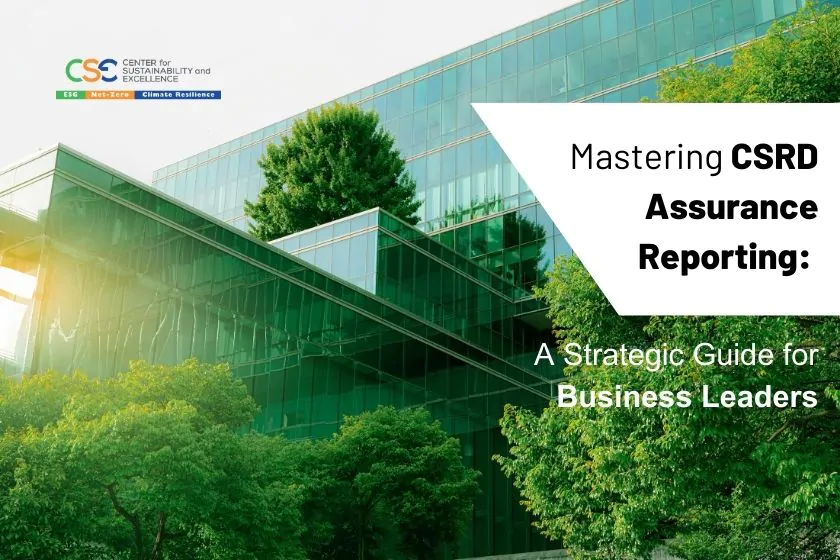Mastering CSRD Assurance Reporting: A Strategic Guide for Business Leaders
As sustainability regulations tighten across the globe, businesses are facing increasing pressure to elevate the credibility of their sustainability reporting.
The Center for Sustainability and Excellence (CSE) has identified External Assurance as one of the most crucial trends shaping the corporate sustainability landscape in its Annual Sustainability & ESG Research 2025. With the Corporate Sustainability Reporting Directive (CSRD) mandating stricter disclosures and assurance requirements, companies must proactively prepare to ensure compliance, mitigate risks, and strengthen their ESG credibility.
Why External Assurance Matters
CSE’s latest research underscores the growing significance of independent assurance in enhancing trust, transparency, and accountability in sustainability reporting. The study found that organizations with high ESG ratings tend to be more profitable, further reinforcing the business case for robust sustainability practices. In fact, with over 8,000 North American companies impacted by CSRD, preparation for external assurance is no longer optional—it’s a business imperative.
How to Prepare for CSRD Assurance Reporting
First, companies must familiarize themselves with the CSRD framework, including the European Sustainability Reporting Standards (ESRS). These standards dictate how companies should disclose their sustainability efforts, requiring a structured, transparent, and verifiable approach to reporting.
Next, one of the core principles of CSRD reporting is double materiality—evaluating not only how sustainability issues impact the company but also how the company impacts the environment and society. Organizations must, therefore, clearly define material ESG factors, ensuring their reports capture meaningful and relevant data.
Then, reliable sustainability reporting begins with accurate and verifiable data. Businesses should, accordingly, implement traceable data collection mechanisms, audit trails, and real-time monitoring systems to enhance data integrity and facilitate the assurance process.
Finally, external assurance involves working with independent third-party auditors who assess the accuracy, completeness, and reliability of sustainability disclosures. Engaging with assurance providers early ensures companies can align expectations, address potential gaps, and streamline the verification process.
Key Considerations for Assurance Success
- Data Quality & Verifiability: CSE research highlights that high-quality, verifiable data is fundamental to successful external assurance. Businesses must ensure consistency, accuracy, and completeness in reported ESG metrics.
- Comprehensive Documentation: Detailed documentation of methodologies, assumptions, and data sources is essential. Well-structured records support auditor evaluations and minimize compliance risks.
CSRD Implementation Phases: What to Expect
The CSRD assurance process unfolds in two key phases:
- Limited Assurance Engagement (2024 Onward)
- Initial compliance phase requiring a moderate level of scrutiny.
- Auditors assess plausibility and completeness of reported information.
- Reasonable Assurance Engagement (By 2028)
- A more rigorous in-depth verification process.
- Involves comprehensive audits, internal control assessments, and substantive testing.
Navigating Risks: Common Challenges in Assurance Reporting
- Compliance Risks: Non-compliance with CSRD can lead to financial penalties, reputational damage, and legal consequences.
- Data Management Complexity: Ensuring accuracy, traceability, and completeness of ESG data across multiple business functions can be challenging.
- Resource Allocation: Implementing robust reporting frameworks and assurance processes requires significant investment in technology, personnel, and external auditors.
The Bottom Line: Strengthening ESG Credibility Through Assurance
With 92% of companies with strong ESG ratings demonstrating higher profitability, the integration of external assurance is a strategic advantage rather than a regulatory burden. CSE’s research makes it clear: businesses that proactively invest in high-quality sustainability reporting and assurance processes will, therefore, gain a competitive edge, enhance stakeholder trust, and future-proof their operations against evolving regulations.
Consequently, now is the time for companies to take decisive action, build robust sustainability frameworks, and embrace external assurance as a cornerstone of credible ESG reporting. Furthermore, with the CSRD deadline approaching, those who prepare early will not only ensure compliance but also unlock new opportunities for sustainable growth and long-term success.
The Center for Sustainability Excellence (CSE) offers a Certified Sustainability (ESG) Practitioner Program. This program provides participants with the knowledge and skills they need to become qualified Sustainability ESG Practitioners. The program covers a variety of topics, including Sustainability (ESG) and the Business Case for Adoption, Global and Local Legislation for Sustainability and GHG Emissions, and Sustainability Strategies and Most Widely Used Standards & ESG Ratings. Participants who successfully complete the program will join the largest network of Sustainability Professionals.







